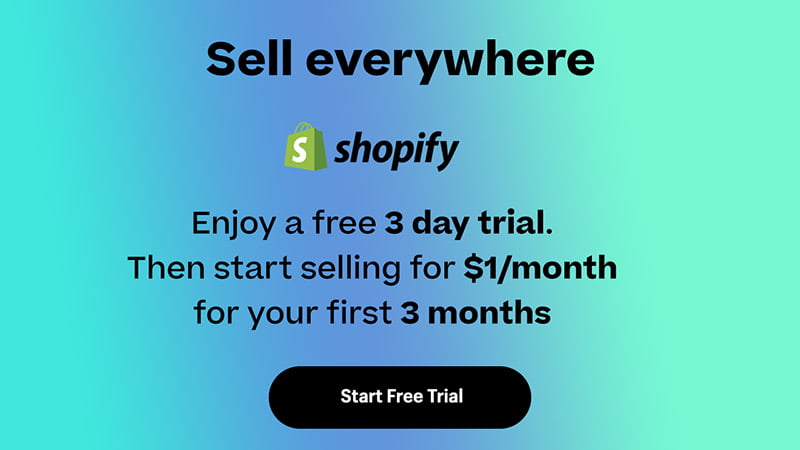Disclosure: We may earn a commission or fee from some of the links in our content. However, this does not affect our recommendations. Learn more.
Quick Answer: The best Supliful alternatives in the UK are The Supplement Warehouse, Genie Lab, and Dropified Private Label On Demand.
If you’re struggling with slow shipping, limited branding options, or you’re just tired of how clunky Supliful feels when scaling a UK store, these options are faster, better, and actually built for real ecommerce growth.
I’ve been running dropshipping and print-on-demand stores for over a decade. I’ve tested dozens of white-label suppliers, fulfillment services, and private label platforms.
Supliful is a solid idea on paper, but when you’re targeting UK customers and want to build a real brand, you’ll quickly run into problems.
Shipping times are unpredictable. Branding is limited. And customer service? Let’s just say you won’t be writing home about it.
Here’s what’s working instead — with real pros, cons, pricing, and verdicts for each option.
Supplier Comparison Table: Best Supliful Alternatives for UK Sellers
| Supplier | Fulfilment Location | MOQ | Branding Level | Shipping Speed to UK | Best For |
|---|---|---|---|---|---|
| The Supplement Warehouse | UK | 25+ | Solid white/private label | 2–4 days | New sellers needing fast fulfilment |
| Genie Lab | UK | 100+ | Premium private label | 2–3 days | Brands ready to invest in design |
| Dropified POD | US | None | Basic white label | 7–14 days | Testing new brands easily |
| Avasam | UK | Low/None | Varies by supplier | 2–3 days | General UK dropshipping |
| Printful + Supplements | Mixed (Custom Setup) | Varies | Full creative control | 2–5 days (Printful) | Lifestyle or influencer brands |
There’s no single “best” supplier — it depends on your goals, your budget, and how fast you want to grow.
What Supliful Gets Right (and Where It Falls Apart)
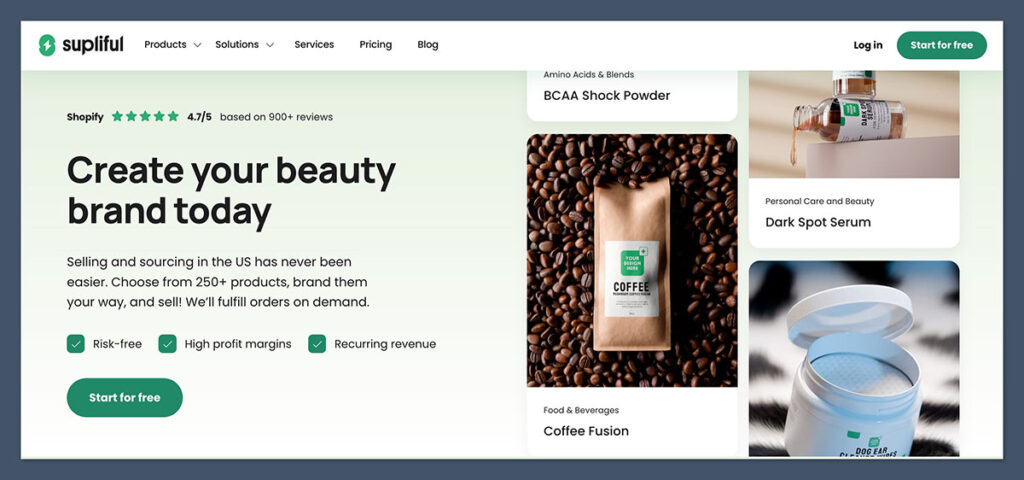
Let’s give Supliful some credit first.
If you’re brand new to dropshipping supplements, it’s honestly one of the easiest ways to get started.
I’ve tested it on two test stores just to see how fast I could launch — and to their credit, I had a basic brand up and running in less than 48 hours.
That kind of speed is rare. You don’t need to worry about minimum orders. You don’t need to deal with factories or sourcing.
And the product range is pretty decent for a beginner — powders, capsules, gummies, and a few trendy SKUs like greens and collagen.
Here’s what it does well:
- Super beginner-friendly: No real learning curve. Just sign up, pick your products, and go.
- Low risk: No upfront inventory cost, no warehouse stress.
- Decent variety: It’s not Amazon-level, but there’s enough to launch a solid niche store.
- Simple Shopify integration: It syncs fairly easily for automatic order fulfilment.
So if you’re just dipping your toe into the supplement space and need something simple, Supliful’s structure can get you going fast.
But that’s where the praise mostly ends.
Once you start getting real orders — especially if your customers are based in the UK — the cracks show up fast.
Verdict:
Supliful works for US-based creators and startups testing out ideas.
But if your audience is in the UK — or you’re serious about growing a real brand with long-term potential — it’s not the right platform.
Too slow, too basic, and not scalable.
The longer you stick with it, the more it’ll cost you in refunds, lost customers, and wasted time.
What Makes a Great Supliful Alternative (Especially for UK Sellers)
After testing dozens of suppliers and running multiple UK-based ecommerce stores, I’ve got a clear checklist I use before trusting any dropshipping platform — especially in supplements.
The supplement niche isn’t like T-shirts or mugs.
Customers are putting this stuff in their bodies, and expectations are sky high. If something feels cheap or shipping drags, your brand is done.
So when I’m looking for a Supliful replacement, I’m not just chasing low prices. I’m looking at fulfilment, branding, support, and scalability.
Because if you’re serious about building a real brand in the UK, these are non-negotiables.
Let me break it down.
1. The Supplement Warehouse
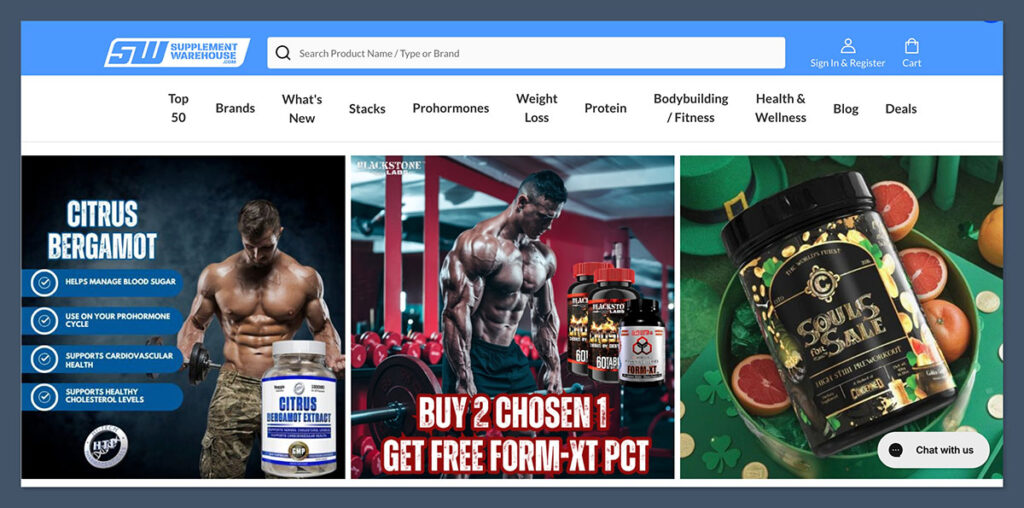
If you want a UK-based alternative that gives you faster shipping, more control, and real white label options, The Supplement Warehouse is one of the strongest options I’ve found.
It doesn’t have the slick front-end Supliful offers, but behind the scenes?
It’s a better machine — especially if you’re targeting UK customers and want to build a serious brand.
They manufacture and fulfil directly from the UK, which means you’re not dealing with long shipping times or customs issues.
That’s a big win right out the gate.
When I tested them, I saw delivery times averaging 2–3 working days to most UK addresses. No delays, no import taxes, no unhappy customers.
Another major plus is how they handle small batch orders.
You don’t need to commit to big volume straight away. MOQs start at just 25 units, which gives you room to test different SKUs or target niches without tying up thousands of dollars in dead stock.
They also offer both white label and private label support. So whether you want to stick your logo on their formulas or go fully custom with your own ingredients and branding, you’ve got options.
Pros:
- UK fulfilment = faster shipping
- Wide product range
- Real branding options
- Beginner-friendly but built for scaling
Now, it’s not perfect. There are some trade-offs.
Cons:
- Not fully automated dropshipping
- Limited tech integrations
- No real-time order dashboard
Despite that, the trade-offs are usually worth it. You get faster shipping, better control over your brand, and the ability to grow without running into a ceiling.
Verdict:
If you want control and UK-speed shipping, this is a top-tier option.
Better profit margins, more branding flexibility, and a stronger long-term setup than Supliful.
You’ll have to be a bit more involved day-to-day, but the payoff is a brand that feels premium — and performs like one.
This is what I recommend for sellers who are serious about turning their store into something that lasts.
2. Genie Lab
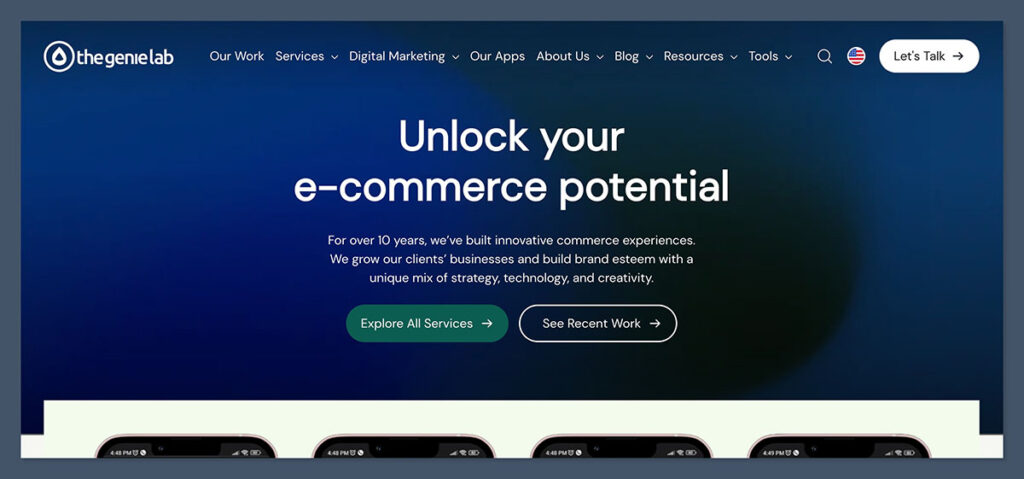
If your goal is to build a premium supplement brand — not just sell products with your logo — Genie Lab is one of the few suppliers that truly gets it.
This isn’t a cheap plug-and-play solution like Supliful. It’s for sellers who care about brand perception, packaging design, and standing out in a crowded market.
When I first came across Genie Lab, what stood out was how brand-first their whole process felt.
They don’t just slap a label on a generic bottle. They work with you to build something that looks and feels like a premium product you’d see on shelves in Selfridges or Whole Foods.
From label design to custom boxes to full branding consultancy, Genie Lab understands ecommerce sellers because they’ve worked with dozens of them.
You’re not just talking to a factory — you’re talking to a partner who gets DTC.
They also offer fulfilment from the UK, so delivery speeds are tight and reliable.
No customs delays. No disappointed customers. That alone makes it a solid move if you’re targeting UK or EU buyers.
Pros:
- Top-tier branding and design
- UK-based fulfilment with strong logistics
- Support for both Shopify and Amazon FBA
- Full process handled under one roof
Cons:
- Higher base costs
- Higher MOQs for custom jobs
- Not beginner-friendly
What I liked most when testing them was the professionalism. They don’t treat you like just another seller. They ask the right questions — your customer avatar, brand goals, sales channels — and help shape the packaging and product to match.
It’s the kind of service you usually only get once you’re already a big brand.
Verdict:
If you’re building a premium brand or influencer-driven supplement line, Genie Lab makes a ton of sense.
The prices are higher, yes — but the packaging and presentation are on a different level. It’s not for beginners, and it’s definitely not as fast or hands-off as Suppliful.
But if your brand matters to you, and you’re serious about long-term positioning, this is one of the strongest UK options I’ve used.
3. Dropified Private Label On Demand
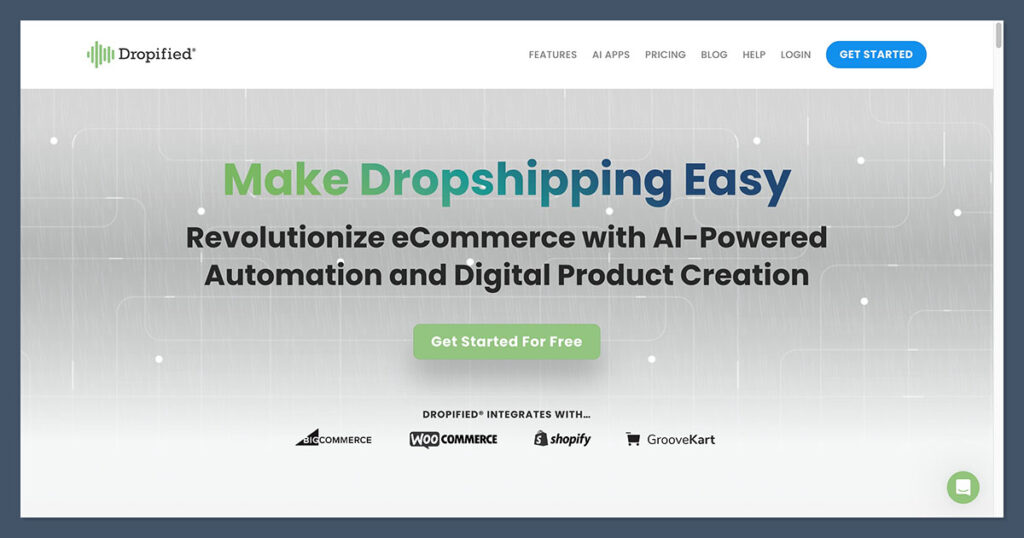
Dropified is a well-known name in the dropshipping space — especially in the US — and their Private Label On Demand service is one of the more beginner-friendly ways to start a white-label supplement business.
Even though they’re based in the States, they do ship to the UK, and the platform is still a viable option if you’re starting small and want an easy setup.
When I tested Dropified’s private label offer, what stood out was how little you actually had to do to get started.
They’ve systemised the whole process.
You pick a product from their catalog — whether that’s a supplement, coffee, skincare, or even pet products — upload your logo, and within a few days, your own brand is live.
You don’t need to deal with design files, supplier emails, or printing logistics.
It’s pretty much the fastest way to launch a brand if you don’t want to mess with fulfilment, packaging, or sourcing.
Everything from product creation to warehousing to shipping is handled for you.
Pros:
- Wide product range
- Done-for-you label design
- No inventory required
- Easy Shopify integration
Cons:
- Shipping from the US is slow for UK orders
- Higher shipping costs to the UK
- Branding is decent, but not premium
So while Dropified makes the process dead simple, it comes at the cost of shipping speed, costs, and brand depth. Still, for testing products or validating a niche, it’s one of the most efficient tools out there.
Verdict:
If you want a US-based platform that’s beginner-friendly but UK-compatible, Dropified gets the job done.
It’s great for low-risk brand launches, product validation, and simple Shopify integration.
Just be aware — if you’re planning to scale in the UK, the slow shipping and high international fees will catch up with you.
I’d call this more of a testing platform than a long-term UK solution.
Great for launching. Not built for scaling.
4. Avasam
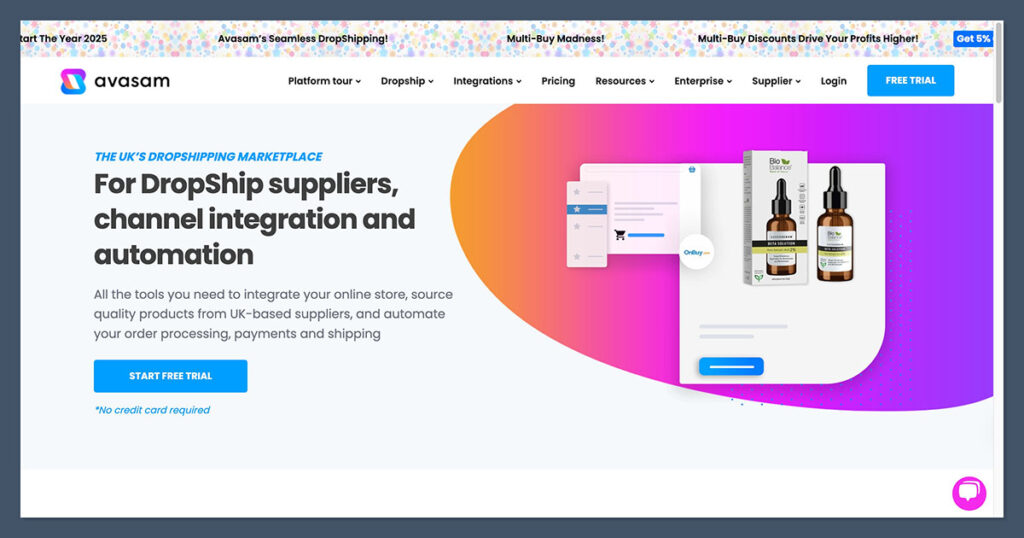
Avasam isn’t just a supplement supplier — it’s a full-blown UK dropshipping marketplace, and that can be both a good and bad thing, depending on what you need.
I started testing Avasam about two years ago when I was looking for UK-based fulfilment options outside the usual supplement networks.
What drew me in initially was the variety.
You can access suppliers for supplements, skincare, beauty, electronics, even home goods. It’s a one-stop shop for sellers who want flexibility and aren’t locked into just one niche.
From a logistics point of view, Avasam’s biggest strength is its UK warehousing network.
Orders are picked, packed, and shipped from within the UK, which means fast delivery and no customs drama.
For stores targeting UK customers, that alone makes the platform worth looking at.
And when it comes to automation? It punches above its weight.
The platform connects with Shopify, WooCommerce, BigCommerce, and even eBay — and it handles order syncing, tracking updates, and stock level automation.
That’s a massive time-saver once you start processing 10+ orders a day.
Pros:
- Fully UK-based suppliers
- Real-time stock updates
- Solid platform integrations
- Low or no MOQs
Cons:
- Not supplement-specific
- Branding options are limited
- Takes time to filter suppliers
That said, I’ve found a few hidden gems on Avasam over the years.
One UK-based supplement supplier I worked with delivered consistently in under 48 hours, and their stock was always reliable.
But I had to dig through quite a few mediocre ones to find them.
Verdict:
If you want variety, automation, and fast UK shipping, Avasam is worth testing. It’s not built solely for supplements, and you’ll need to do a bit of legwork to find the right supplier.
But once you do, the benefits — fast delivery, no MOQs, and easy integration — can absolutely make it a smart part of your UK dropshipping setup.
I’d recommend it more for intermediate sellers or anyone wanting to diversify product lines while keeping logistics simple.
5. Printful + Supplements via Custom Integration
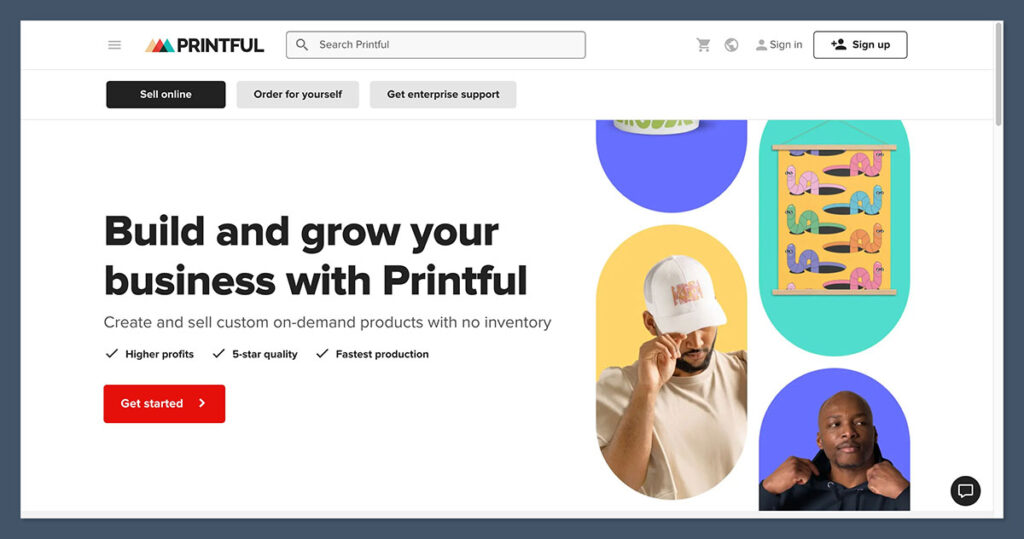
This one’s for the builders — the store owners who aren’t afraid to get a little hands-on in exchange for more control and better long-term margins.
Instead of sticking to a single supplier, you can combine Printful for apparel with a UK-based supplement supplier (like The Supplement Warehouse or Genie Lab).
The idea is simple: sell clothing, accessories, and branded wellness products together, under one unified lifestyle brand.
It’s a model I’ve used for multiple clients in fitness, self-care, and holistic health.
You create a storefront that sells both activewear and supplements, or apparel plus skincare — and position everything under the same aesthetic and message.
It works brilliantly for influencer-led brands, coaches, or niche creators building a community.
To make it work, you just need to connect the two suppliers using Zapier, Order Desk, or a fulfilment tool that can handle multiple vendors.
It’s not plug-and-play like Supliful, but if you’re okay setting up a few automations, the payoff is worth it.
Pros:
- Full brand control across categories
- Easy to test bundles or new angles
- Cross-sell like crazy
- Printful handles apparel fulfilment 100%
Cons:
- More moving parts = more complexity
- No centralised dashboard
- Fulfilment timelines vary
Even with the extra coordination, the benefits here are real.
You create a unique value proposition, your branding feels tight, and your upsell potential increases massively.
I’ve seen this approach build strong customer loyalty over time — especially when the brand story connects the products.
Verdict:
If you’re building a lifestyle brand in fitness, wellness, or skincare, this is a smart combo play.
It takes a bit more effort to set up, and you’ll need to manage multiple fulfilment flows — but the profit potential and brand loyalty make it well worth the work.
For creators, coaches, and anyone with a strong niche audience, this is one of the most flexible and scalable models out there.
Honourable Mentions (Still Worth Testing)
Not every supplier fits neatly into a top five list, but that doesn’t mean they’re not worth your time.
Over the years, I’ve tested quite a few platforms that didn’t fully make the cut for my main stores — but they still had something unique to offer, depending on your goals, budget, or tech setup.
If you’re willing to experiment or want to build out a more hybrid setup, these are all options to keep in your back pocket.
Synctivate
What it is: A US-based white-label supplement supplier with branding and fulfilment options, plus UK shipping.
Why it’s worth testing:
- Branding is solid, and they offer a good level of support for packaging and label design.
- Shipping to the UK is available, but expect longer delivery times (7–14 days).
- Not as beginner-friendly as Supliful, but better suited for brands wanting more control.
Best for: Sellers willing to trade slower UK shipping for stronger branding and a broader supplement range.
Sup Dropshipping
What it is: A general dropshipping platform that includes supplements as part of its broader catalogue, with automation and fulfilment tools built in.
Why it’s worth testing:
- It integrates easily with Shopify, WooCommerce, and other platforms.
- You can source supplement products and customise basic branding.
- Offers bulk fulfilment options and some level of automation that’s rare outside big players.
Best for: Sellers looking to automate multiple product types (supplements + other categories) under one dashboard.
Sellvia
What it is: A US-based fulfilment service and product sourcing platform that’s just starting to offer UK/EU options.
Why it’s worth testing:
- Great for building a US-based store first, then expanding into the UK as they continue scaling their international warehouses.
- Their fulfilment times to the UK aren’t perfect yet, but it’s improving.
- Offers bundled store-building services if you want a more guided experience.
Best for: Beginners testing the waters in the US, or UK sellers planning to eventually sell to US and EU markets.
Yakkyofy
What it is: An automation-heavy dropshipping platform with strong backend systems and customisation tools.
Why it’s worth testing:
- Their automation features rival bigger players like Oberlo used to — from auto-importing to branded invoicing.
- UK fulfilment isn’t their main strength, but if you’re scaling across multiple markets, it handles volume and complexity well.
- Also allows bulk orders and warehousing if you decide to move off dropshipping.
Best for: Advanced sellers running multi-product stores who want a single tool to manage operations and inventory globally.
Printify (with 3rd-party supplement supplier)
What it is: A popular print-on-demand platform for apparel and accessories, but you can pair it with your own supplement supplier using tools like Order Desk or Zapier.
Why it’s worth testing:
- Lets you build a full lifestyle brand with merch + supplements under one storefront.
- Great if you’re already using Printify and want to expand into wellness or fitness niches.
- Zero inventory risk for apparel, with room to grow into higher-ticket products like supplements.
Best for: Lifestyle brands and creators looking to cross-sell health products alongside clothing or merch.
uDroppy
What it is: A European dropshipping platform focused on high-quality suppliers, logistics, and scaling tools.
Why it’s worth testing:
- They pre-vet suppliers and offer better quality control than many standard platforms.
- UK fulfilment is available through EU warehouses, which gives you faster delivery than US-based options.
- Offers services for custom branding and private label, especially if you’re growing into higher volume.
Best for: Intermediate to advanced sellers looking for a European-based fulfilment engine that scales cleanly without switching platforms.
Final Thoughts on These Platforms:
These honourable mentions might not be the best plug-and-play replacements for Supliful, but they all bring something useful to the table.
Whether it’s better automation, different product categories, or more flexibility in fulfilment, each one is worth exploring — especially if you’re building something a bit outside the standard DTC playbook.
Test small, request samples, and check fulfilment times. The hidden gem for your niche might be one of these.
What I Recommend (After Running 7+ Stores)
After more than a decade in ecommerce, and seven different stores across fitness, wellness, and lifestyle niches, I’ve made plenty of mistakes — and learned the hard way what separates a scalable brand from one that crashes under its own weight.
Here’s the real talk.
Not every supplier is right for every store. What works for someone doing 5 sales a week is going to collapse if you’re doing 100 orders a day.
That’s why it’s so important to pick the right supplier for your current level — not the one that looks best on paper.
Here’s how I break it down based on where your business is right now.
If You’re Just Getting Started
You don’t need complexity — you need speed, simplicity, and low risk. Your first supplier should help you test demand without locking up cash in stock.
My recommendation:
- The Supplement Warehouse – UK-based, flexible MOQ, solid fulfilment
- Avasam – Broad marketplace, fast shipping, no inventory required
Why it works:
- You can test products without holding inventory
- Shipping is fast and local, so refunds stay low
- You’re not tied to a complex tech stack — just plug in and start selling
The key here is to validate your product and your audience.
Focus on building out 1 or 2 SKUs, get your first few dozen orders, and keep things lean. Your goal is to prove the concept, not build the next MyProtein on day one.
If You’re Mid-Level and Want Real Branding
Once your product is selling consistently, it’s time to upgrade the brand experience. You’ll need better packaging, cleaner labels, and something that doesn’t scream “dropshipped on a template.”
This is where you can charge more, build trust faster, and get repeat customers.
My recommendation:
- Genie Lab – Premium branding, UK-based fulfilment, full private label support
What to expect:
- Stronger profit margins through better perceived value
- Branding that gives you an edge in influencer campaigns or paid ads
- Custom packaging and inserts for a proper unboxing experience
You’ll need a budget of $1,000–$2,000 minimum to get started at this level. But it’s worth it.
At this stage, you’re not just selling products — you’re building a brand.
If You’re Scaling Toward 6-Figures or More
This is where things change. The systems that got you to $10k/month probably won’t get you to $50k or $100k. At this point, you need a supplier that can handle volume, logistics, and multiple fulfilment channels.
I’ve seen a lot of stores plateau because they tried to scale with beginner-level suppliers — and it cost them in refunds, negative reviews, and burnout.
My recommendation:
- Juvo Plus – Bulk pricing, Amazon and Shopify support, reliable logistics
- Pair with your own custom fulfilment partner for branded packaging
- Use Order Desk, Zapier, or a virtual assistant to streamline order routing
Why this setup works:
- You get price breaks on volume without compromising fulfilment speed
- Your branding stays consistent across Shopify, Amazon, and even B2B
- You’re building infrastructure, not just chasing ads and churn
At this level, you need systems, not just suppliers.
That means documenting processes, automating what you can, and preparing your backend for spikes in demand.
My Hard-Earned Lesson
In 2021, I made the mistake of sticking with a US-based supplier for a UK-targeted store. Orders took 10–15 days to arrive. I racked up $4,000 in refunds in one quarter alone.
We were running ads at scale, the front end was humming — but the backend fell apart.
That’s when I realised: no matter how good your product or offer is, fulfilment speed will kill you if it’s off. Especially in the UK, where buyers expect next-day delivery from Amazon.
Since then, I’ve stuck to UK or EU-based fulfilment for all UK-targeted stores — and it’s made a massive difference in retention, reviews, and profitability.
Bottom line:
Match your supplier to your current stage. Don’t overbuild too early.
But also don’t cling to beginner tools when you’re trying to scale. Every level has its own supplier strategy — and choosing the right one can save you thousands and keep your customers happy.
If you’re not sure where to start, test small. Order samples. Validate delivery times. Then go all in on the one that gives you the control you need to grow.
That’s how you build something that lasts.
Final Word: Build the Brand You Actually Want
Let’s be honest — Supliful is a great concept, but poor execution, especially if you’re selling to customers in the UK.
The slow shipping, generic branding, and limited scalability make it hard to build anything beyond a basic test store.
It’s not enough to just slap your logo on a white bottle and hope for the best. If you’re serious about ecommerce — and especially if you want to build a long-term brand — you need more control, faster fulfilment, and better branding options.
The good news? You’ve got real alternatives now. UK-based fulfilment is easier to access. Branding services are affordable.
You don’t need to be an Amazon-level operation to run a slick, high-converting store with real margins.
My Recommendation Before You Commit:
- Order samples from at least two suppliers
- Time the delivery to the UK — not just in theory, but in practice
- Check the branding — ask for a proof of labels, packaging, and inserts
- Test fulfilment support — ask questions, get a feel for their responsiveness
You’ll learn more in 10 days of testing than from 50 hours of research. That’s how I’ve found most of the reliable suppliers I still work with today.
Once you find a supplier who ticks the right boxes — shipping speed, product quality, branding, and pricing — that’s your green light to double down and scale. Build systems around them.
Lock in pricing. Automate fulfilment. Then focus on marketing and retention.
Because at the end of the day, you’re not just selling supplements. You’re building a brand — and that means owning the customer experience from end to end.
Your supplier isn’t just a vendor. They’re the engine that powers the trust between you and your audience.
If that engine fails, the whole thing falls apart.

